May 19, 2025 | 12:36 GMT +7
May 19, 2025 | 12:36 GMT +7
Hotline: 0913.378.918
May 19, 2025 | 12:36 GMT +7
Hotline: 0913.378.918
In rice cultivation, each method of transplanting employed by producers in the Red River Delta has both advantages and disadvantages. Nevertheless, according to the evaluation, the use of a rice transplanter is a solution for simultaneously addressing multiple "bottlenecks" in the transplant stage.
Planting rice seedlings on trays enables farmers to mitigate the effects of unfavorable weather in order to protect the seedlings and reduce the labor involved in collecting soil, tilling, and plugging seedlings.
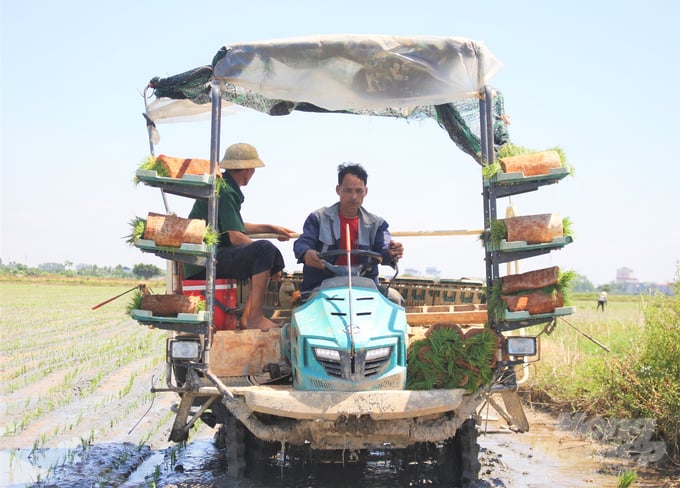
Using a transplanter-plating tray is considered a solution to solve many "bottlenecks" in rice production at the same time. Photo: Trung Quan.
In addition, rice seedlings can be transplanted onto trays by hand, traditionally, or with a machine, which is extremely convenient for farmers.
Planting by machine aids in altering the practice of planting densely, deeply, and without rows, is conducive to the application of mechanizationin the fertilizing and weeding stages, promotes the consolidation of plots, encourages the formation of cooperatives and cooperative groups, and creates production links. Simultaneously, no rice transplanter can service every household, so the locality selects only certain varieties for transplanting, which simplifies the scheduling of irrigation, harvesting, care, and plant protection.
According to the National Center for Agricultural Extension, labor productivity (planting stage) increased by five to seven times in the Red River Delta after the implementation of transplanting machine models. The quantity of seed utilized by a transplanter is approximately 35kg/ha, a reduction of 30-40% compared to manual transplanting.
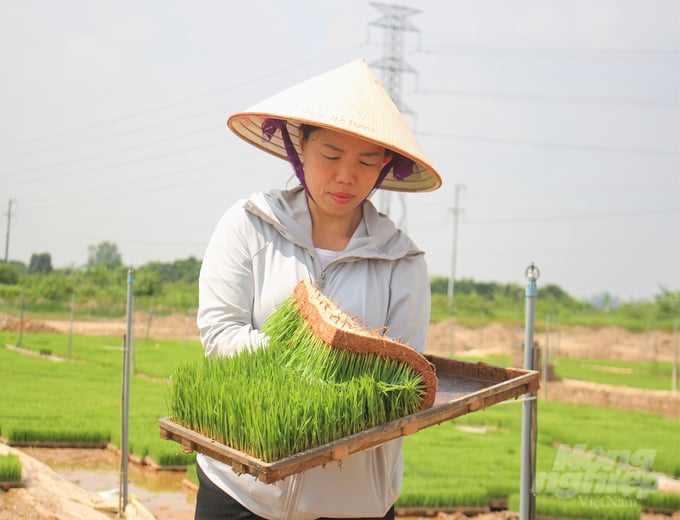
Despite many advantages, the expansion of the use of tray plating - transplanters into production is still very slow. Photo: Hoang Anh.
In addition, the use of transplanters makes the field appear more open, the rice develops well, the plants are sturdy, less prone to collapsing, it is simple to control weeds and pests, the use of fertilizers and pesticides is reduced, and harvesting is made more convenient. machine design. Utilizing a transplanter reduces average input costs by 2 to 3 million VND per hectare, increases rice yield by 500 to 800 kg per hectare, and boosts income by 4 to 4.5 million VND per hectare.
Mr. Tran Quyet Thang, head of the Department of Agriculture and Rural Development of Thanh Liem district (Ha Nam), stated that the area of direct cultivation in the district's localities has steadily increased over the past few years. Annually, direct cultivation accounts for over 90 percent of the district's total rice area for both crops.
The fact that people misuse seeds, fertilizers, and pesticides when sowing leads directly to high input costs, not to mention pesticide residues that negatively impact human health, organisms, water sources, and the environment.
Moreover, climate change is becoming increasingly extreme and unpredictable. In the crop, heavy rainfall frequently occurs, causing inundation at the same time as sowing, causing many rice areas to perish, necessitating repeated reseeding, and negatively impacting the season and production costs.
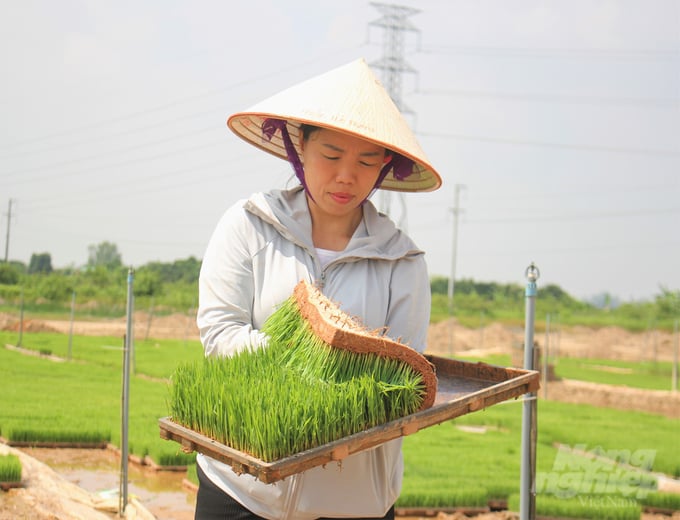
Ms. Nguyen Thi Tuyet, technical officer of Hung Yen Agricultural Seed Center, said that transplanting machines help reduce seasonal pressure and overcome labor shortages. Photo: Trung Quan.
Therefore, the promotion of rice transplanting mechanization will completely eliminate the shortcomings of direct sowing.
In the Red River Delta, Hai Duong is a province with a relatively extensive direct seeding area. Over the years, the province has been a pioneer in exploring new planting techniques to progressively assist farmers in abandoning the practice of direct sowing and increasing the value of their rice harvest. One of these methods is line-by-line sowing.
Mr. Nguyen Phu Thuy, Deputy Director of the Hai Duong Agricultural Extension Center, determined that the sowing method shares similarities with the direct sowing method, including soaking techniques, fermenting rice seeds, tilling, and surface water regulation in the field, with the direct sowing method. Therefore, when it was recently introduced back, people were eager to sample it. However, after a period of implementation and replication, the disadvantages of this method became apparent, causing the majority of households to cease interest.
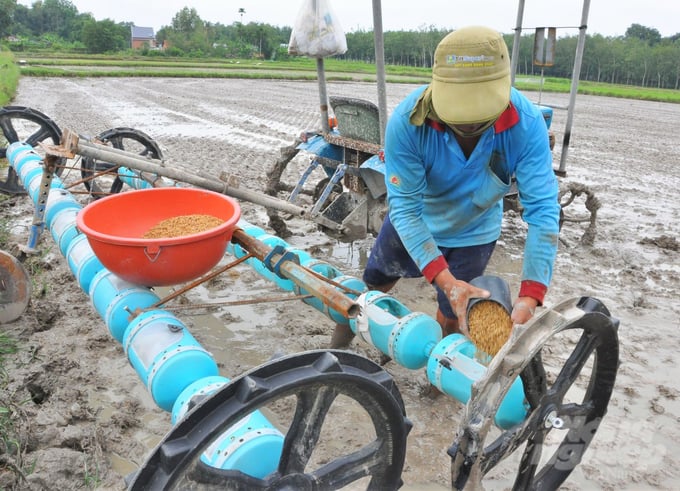
The sowing method when applied in the Red River Delta provinces has revealed certain limitations. Photo: HA.
Mr. Vu Dinh Tam, director of the Tan Hong Agricultural Mechanization Services Cooperative in Mo Trach village, Tan Hong commune, Hai Duong, stated that the most difficult aspect is the high initial investment, which includes the purchase of machines, trays, seeding machines, and the construction of facilities, among other things.
Specifically, a tray plating production facility requires a land source large enough to accommodate the sowing machine, plating tray, and irrigation system. For example, the Commune People's Committee facilitated a five-year sublease for his cooperative in an area larger than 4,000 square meters. However, on average, each crop of cooperatives deploys the service of transplanting - plating trays for an area of more than 400 samples, requiring the production of approximately 40,000 plating trays; therefore, this area is insufficient to accommodate the total number of plating trays.
According to Mr. Tam, the area lacks suitable substrates, so the cooperative must travel to Thanh Hoa province to purchase them. Due to the fact that sieves and sowing machines cannot be placed outdoors, it is necessary to have a sufficiently large space to set up a gathering workshop, position sieves, and sow machines in order to reduce the cost of transporting the medium in large quantities.
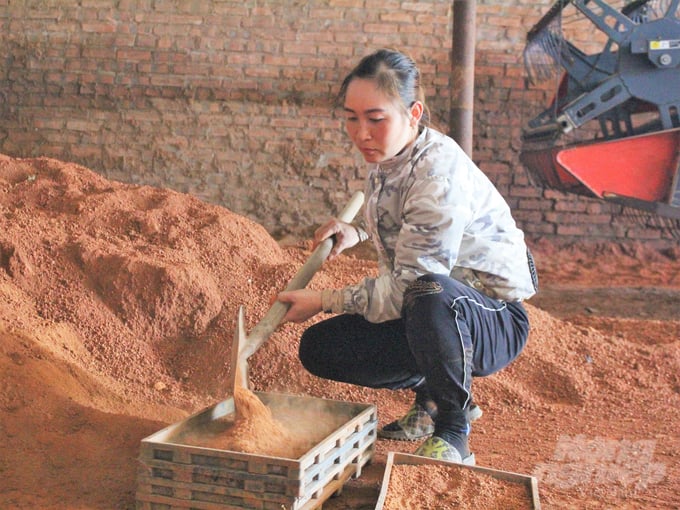
Tan Hong Agricultural Mechanization Service Cooperative, Mo Trach village, Tan Hong commune (Binh Giang, Hai Duong) is facing many difficulties when the production area for tray plating is limited. Photo: Trung Quan.
When completed products are plated on trays, a large area is also required for placement and maintenance. Because the yard where the tray is to be placed must provide technical factors such as lofty, spacious, and rapid drainage. However, cooperatives must still seek assistance at vacant lots, stadiums, and cultural centers in municipalities within the commune.
Borrowing land to position trays is always riddled with potential dangers, such as unwanted heavy rain and strong gusts. Inadequate drainage trays result in overflow, which can easily reduce the quality of the plated food; many damaged trays must also be discarded. In addition, if the plating yard is too far away, the care and protection procedure will be hampered because it will be easier to steal, more expensive to transport, and the plating quality will suffer. Not to mention the fact that in many areas people oppose cooperatives borrowing communal land for production.
According to Mr. Tam, it is very regrettable that the demand for tray plating-transplanting machines has increased, but the response capacity of service teams is limited; consequently, many households have been unable to convert to these machines. The server proprietor has not been able to increase profits by promoting the maximum capacity of the machine via machine transplantation.
Translated by Linh Linh

(VAN) The German Agricultural Society (DLG) explores the possibility of establishing a mechanization service center in Vietnam’s Mekong Delta to support farmers in accessing and utilizing advanced machinery.

(VAN) On May 16, the Department of Water Resources Management, in collaboration with the Food and Agriculture Organization of the United Nations (FAO), held a signing ceremony for the GEF-8 project document.

(VAN) Food safety, mechanization, vocational training, and market opening are key areas of cooperation expected between the Vietnamese Government and the Federal Republic of Germany.

(VAN) Deputy Minister Nguyen Quoc Tri also expressed his hope that Cuba will soon overcome its current challenges, attain food security, and further expand cooperation with Vietnam.

(VAN) The project contributes to enhancing the resilience of communities vulnerable to the impacts of climate change, with a primary focus on local women.
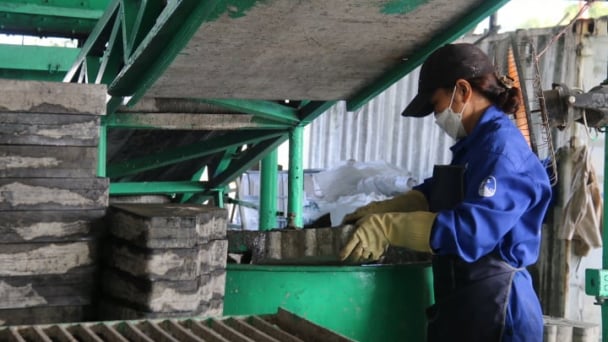
(VAN) Green materials help save energy and resources. However, after more than 10 years, Vietnam has only developed over 200 green buildings with more than 6 million square meters of floor space.

(VAN) Vietnam - Thailand Business Forum 2025: One plus one on three connects, marking a milestone in the comprehensive strategic partnership between the two nations.